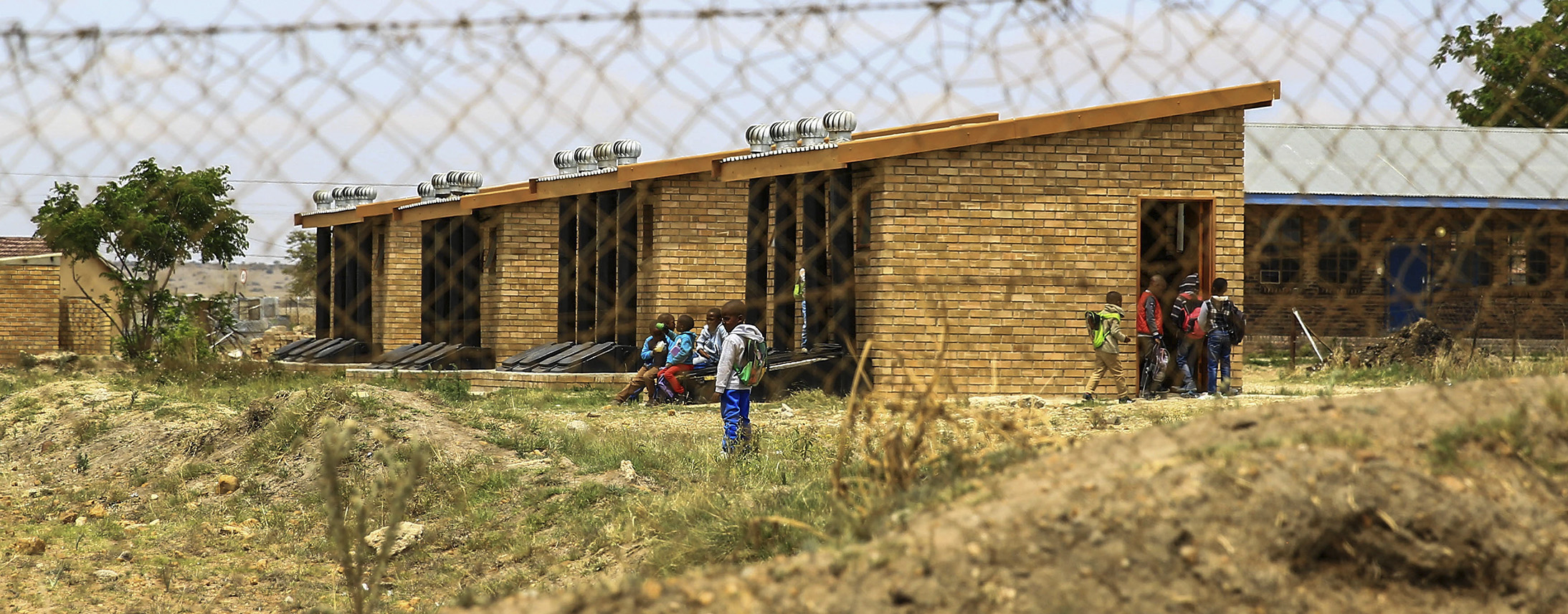WORLD TOILET DAY
Sustainable school sanitation: We need more than quick fixes and empty promises

It has been six years since little Michael Komape drowned in a pit toilet at his school. On the eve of World Toilet Day, Section27, which represented the Komape family in their quest for justice, reports on the state of sanitation in schools in 2020.
Close to a year ago, the family of Michael Komape – a five-year-old learner who fell into a pit toilet at Mahlodumela Primary School in Limpopo and drowned – won an important battle at the Supreme Court of Appeal (SCA). The SCA stated, in a “stinging rebuke”, that “the failure to provide proper sanitation facilities at schools is a breach of rights” and ordered “those in authority to take action to improve the situation”.
Thursday November 19 is World Toilet Day – a day observed by the United Nations to raise awareness about the need for safe, dignified sanitation. This year, the theme for the commemoration focuses on sustainable sanitation and climate change. When we take stock of school sanitation in South Africa – in a period where the Covid-19 pandemic has demonstrated the urgent need for hygienic and safe sanitation infrastructure at schools, among other things – the conditions of school sanitation remain dire and unsustainable.
Many schools do not have reliable access to water, and learners are still forced to use unlawful and unsafe pit toilets. When considering the impacts of climate change – with projections of increased water scarcity and drought – it is likely that the status quo for school water and sanitation infrastructure will become even more challenging to maintain, and that sustainable and imaginative long-term solutions are urgently needed.
Acknowledging the urgent need for safe and hygienic sanitation during the Covid-19 pandemic, the Department of Basic Education (DBE) hired emergency water tankers for 1,428 schools and mobile toilets for 3,157 schools for three months. The department reportedly spent R600-million for the provision of emergency water and sanitation infrastructure. These interventions have been described as “important, but expensive”, with some members of school communities calling the mobile toilets “glorified pit latrines” or “funeral toilets”.
While these temporary solutions are necessary and certainly welcome, they are a short-term solution to a historical problem which needs to be addressed systemically and sustainably. Furthermore, the DBE did not receive additional money to fund these interventions: instead, the money for these costly emergency Covid-19 sanitation facilities was drawn from already stretched budgets for school infrastructure, at the expense of planned infrastructure projects.

It has been six years since Michael Komape drowned in a pit toilet at his school. (Photo: Supplied/News24.com/Wikipedia)
In the June 2020 Supplementary Budget, education infrastructure funding has been subject to substantial reductions and reprioritisations. R2-billion was cut from the Education Infrastructure Grant (EIG) in June. R600-million of this was transferred to the School Infrastructure Backlog Grant (SIBG) to pay for temporary access to water and sanitation in schools. The SIBG, despite receiving reallocations from the EIG, was cut by a further R60-million.
These cuts and reprioritisations represent the continuation – and acceleration – of concerning trends: the reduction of funds spent to address persistent unsafe and unlawful school infrastructure, and declining expenditure per learner in real terms.
These funding shortfalls have set back the delivery of permanent solutions to the school sanitation crisis, with the DBE admitting that it has had to stop or delay 1,938 school infrastructure projects across the country, including projects aimed at maintenance, repairs and upgrades to sanitation infrastructure.
Many schools do not have a reliable source of water and are not connected to bulk water reticulation systems: 1,148 schools across South Africa are reliant on mobile tankers for their water supply; 7,520 schools have a borehole on the school property.
While borehole water is a sustainable alternative, it very often does not cover all of the water and sanitation needs of the school community. In many schools that rely on borehole water, a lack of piping often means there is a single tap situated by the borehole. Learners will congregate at the tap to wash hands and pour water to drink. In most cases, the water from these taps do not reach the toilets, which in many rural schools are often located far from the main school area.
Data from the National Education Infrastructure Management System (NEIMS) report from August 2019 show that across South Africa, 3,710 schools only have unlawful pit toilets on the premises, while 6,089 have a combination of undemolished pit toilets and other sanitation infrastructure on the school property. But recent statements from the DBE contradict this, with the spokesperson for the DBE Albert Gumbo last week claiming that 3,798 schools had “inadequate sanitation infrastructure” and were being targeted for infrastructure delivery interventions. Accuracy and transparency of data relating to school infrastructure, particularly sanitation, remains a crucial concern.

Mahlodumela Primary School, where Michael Komape fell into a pit latrine in 2014. (Photo: Gallo Images / Sunday Times / Simphiwe Nkwali)
The provision of permanent and safe toilets on school premises requires linkages to bulk water supply for which the Department of Water and Sanitation and municipal governments are responsible. For schools that experience challenges with water, and where bulk water and waste infrastructure has yet to be delivered, Enviro-Loos are a popular solution. These are waterless toilet systems, which work through organic decomposition and dehydration, providing a safe non-polluting solution for sanitation. In 2019, 1,895 schools across the country used Enviro-Loos. However, in order to operate effectively, Enviro-Loos require regular maintenance, with the manufacturer recommending quarterly inspections and removals.
In June 2020, Section27’s Covid-19 readiness surveys discovered that because neither provincial education departments nor the DBE were attending to the maintenance of Enviro-Loos, some schools were forced to revert to using pit toilets.
This happened at Kharivha Primary School in Vhembe, Limpopo. In June 2020, Section27 threatened to take the LDOE to court ahead of the reopening of schools on 8 June because the department had failed to provide Kharivha Primary School with safe sanitation infrastructure after their toilets fell apart in 2000. For over 20 years the department failed to repair and upgrade the toilets on the school property. The school governing body at Kharivha resorted to building unlawful pit toilets for learners and staff to use as an interim measure. When these were demolished in May 2020, the school had no functioning toilets for learners or educators to use. After Section27’s engagements with the DBE, two safe and sanitary mobile toilets were delivered to the school the weekend before it was reopened to learners.
The theme for World Toilet Day urges us to think about the effects of climate change on access to sanitation, not only in South Africa but across the globe. United Nations Water estimates that around 4.2 billion people do not have access to safely managed sanitation. In the South African perspective, particularly in the school context, the lack of safely managed and sustainable sanitation not only refers to the need for toilets that effectively manage waste and sanitation solutions, but also manage and prevent the spread of infectious diseases such as Covid-19, typhoid and cholera. There is a desperate need to safely manage sanitation to conjunctly put an end to the tragic incidents of learners drowning in and being crushed by dilapidated pit latrines.
The South African courts have reiterated that the linkages between toilets and learners’ ability to learn should not be understated. In the judgment of Rosina Komape and Others v the Minister of Education and Others, evidence showed that “it would cost as little as R500 per seat for structurally sound seats to have been built”, but the education authorities failed to do so.
Section27 and partners continue to pursue the structural interdict that was handed down by the Polokwane High Court in 2018. The structural order requires the education authorities to audit the state of sanitation and provide a detailed plan for the eradication of unsafe sanitation to remedy the situation. This is a necessary and overdue assessment that will form a crucial part of the plan to eradicate pit toilets once and for all.
Understanding that school sanitation needs to be addressed with more than just sweeping statements and Band-Aid quick fixes, Section27 will fight to ensure that problems with the education authorities’ plans will be addressed and that the departments commit to delivering ecologically sustainable and safe sanitation to all learners as a matter of urgency. DM/MC
Julia Chaskalson and Boitumelo Masipa are communications officers at Section27.




















 Become an Insider
Become an Insider
Comments - Please login in order to comment.